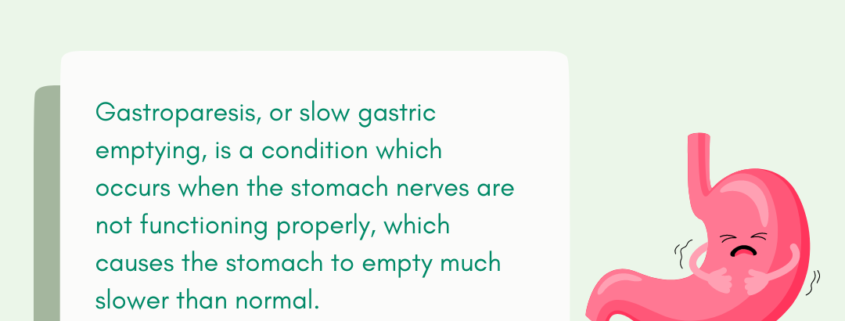Gastroparesis
What is Gastroparesis?
Gastroparesis, or slow gastric emptying, is a condition which occurs when the stomach nerves are not functioning properly, which causes the stomach to empty much slower than normal.
Symptoms of Gastroparesis
– Bloating
– Lack of appetite
– Early satiety /poor appetite
– Constipation
– Heartburn
– Nausea
– Vomiting
– Abdominal Pain
– Malnutrition
– Dehydration
Causes – some causes of gastroparesis include:
– Diabetes
– Some medications such as semaglutide, narcotic pain medicines, some antidepressants, some anticholinergics, pramlintide, and other medicines used to treat overactive bladder can increase the likelihood that an individual will develop gastroparesis
– Underactive thyroid (hypothyroidism)
– Viral infections to your stomach
– Some autoimmune diseases such as scleroderma
– Injury to the vagus nerve due to surgery
– Certain nervous system disorders such as Parkinson’s disease and multiple sclerosis
What nutrition and lifestyle changes can help relieve gastroparesis symptoms?
– Eating regularly throughout the day. Eating only 1 meal per day can worsen feelings of fullness, nausea, and heartburn. It is recommended instead to eat small, frequent meals during the day.
– Fat intake. Reducing intake of high fat food can greatly improve symptoms of gastroparesis. Foods high in fat include fried foods, oils, butter, margarine, cheese, and many creamy dressings.
– Fiber intake. High intake of fiber, especially in one sitting, can also worsen symptoms of gastroparesis. Space out fiber throughout the day instead.
– How you eat: Sitting upright and taking time to chew your food well can greatly impact symptoms of gastroparesis.
– Fluids with your meals can make one feel fuller sooner. Try spacing out liquids throughout the day and abstaining from drinking with meals.
– Taking a walk after eating promotes movement of food through the digestive system. On the opposite side of the spectrum – high intensity workouts can increase symptoms of gastroparesis.
– Alcohol and smoking both increase gastroparesis symptoms.
– Carbonated drinks and drinking through a straw may increase bloating.

What foods can I eat when experiencing a gastroparesis flair?
– Lean protein: lean cuts of chicken, turkey, fish, low fat yogurt, protein shakes, egg whites, nut butter
– Vegetables that are well cooked and peeled or canned
– Fruit: applesauce, bananas, dried peaches/pears, melon, canned or well-cooked fruits without seeds or skins
– Low fat dairy such as 2% milk and low-fat cheese
– Low fiber grains: such as white rice, white bread, crackers, cream of wheat
– Starches: peeled potatoes, canned corned
– If symptoms are severe, choose semi-solid or full-liquid foods. Choose liquid foods with 2 grams of fiber or less per serving.
Reach out to a registered dietitian today to learn more about managing your symptoms of gastroparesis!



